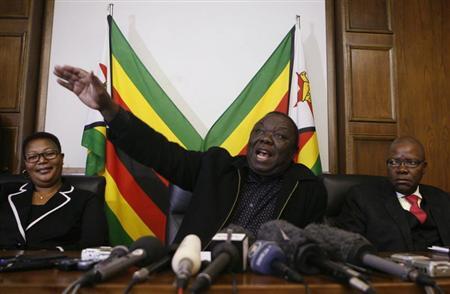Zimbabwean Prime Minister Morgan Tsvangirai, launching his third campaign to unseat veteran President Robert Mugabe, said nothing had been achieved to ensure a fairer vote but even God now wanted Mugabe to go.

He said that would fail because Zimbabweans were itching to remove ZANU-PF after 33 years in office and a record of disastrous economic management.
“We don’t think even God wants Zimbabwe to remain in a permanent state of suffering,” the 61-year-old former union leader told thousands of cheering supporters. “We know that we did not get the reforms that we wanted but because we are people who believe in God, we will succeed.”
At his own campaign launch on Friday, Mugabe said Zanu-PF would finish off Tsvangirai’s Movement for Democratic Change (MDC) with a resounding victory. Both ZANU-PF and the Zimbabwe Electoral Commission have denied any attempt to rig the election.
Tsvangirai’s party wanted the delay in the vote to allow media and security reforms, including equal access to Zimbabwe’s only broadcaster ZBC, which is owned by the state but is in the grip of ZANU-PF.
Although ZBC carried Mugabe’s election campaign launch live on Friday, MDC officials said it had demanded $165,000 to broadcast Tsvangirai’s rally on Sunday.
The MDC also wants the military, which openly campaigns for Mugabe, to stay out of politics and sign an agreement to accept the result if Mugabe loses. Army commanders often say they would not salute Tsvangirai if he won an election.
The 89-year-old Mugabe has ruled Zimbabwe since independence from Britain in 1980. He and Tsvangirai were forced into a power sharing deal after the last, disputed polls in 2008.
Tsvangirai said an MDC administration would repair an economy, wracked by food and fuel shortages, that had shrunk by 40 percent under ZANU-PF before it was rescued by the coalition formed after the 2008 polls. He said he would create a million jobs in five years. Around four fifths of Zimbabwe’s working-age population is jobless.
“We just don’t want to remove ZANU-PF and Robert Mugabe, but we are here to provide a better future,” Tsvangirai said, warning of renewed hardship as he waved a bundle of the old Zimbabwe dollar notes that were abandoned in favor of the U.S. currency when inflation hit over 500 billion percent five years ago.
Political analysts say another contested result could interrupt impoverished Zimbabwe’s recovery from a decade of economic decline that has forced hundreds of thousands to flee the southern African country.
There has been little of the violence and intimidation seen before past elections and Tsvangirai said his MDC believed it would “win, and win big”. But he said that, whoever wins, the legitimacy of the result was under threat.
“What we have witnessed in the last few weeks is a concerted effort designed to rob the election of legitimacy,” he said.

